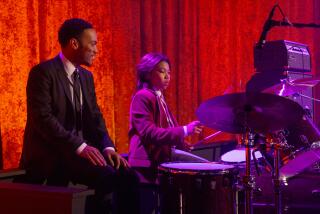Stylish but Violent ‘Brother’ Trips on Its Own Ambitions
- Share via
Here’s a theory. It’s neither profound nor new, but take it for what it’s worth: Gangsters by themselves don’t make up the main reason people are drawn to gangster movies. Rather, people go to such films to see mundane business practices carried to extremes.
“Why?” you ask. Maybe because it throws a tawdry glamour into their own lives and careers. Or perhaps because it gives them ideas on how to carry out difficult day-to-day transactions.
Take “Brother,” a sleek, disorderly hybrid of Japanese warrior saga and American “gangsta” melodrama. From this film, you could get the idea that slicing off your own fingers would win you sympathy and whatever else you might be after. Or that you can persuade a recalcitrant buyer by jamming chopsticks up both his nostrils. That nasty little scene, by the way, may well be the most jarring set piece in a movie that keeps raising the bar on its own straightforward or implied displays of savagery.
Figuratively speaking, it’s all in a day’s work for Takeshi Kitano, the Japanese actor-writer-director-producer whose previous films, notably “Sonatine” (1993) and “Hana-bi” (Fireworks) (1997), blended dark, deadpan comedy, jolting, extravagant violence and rueful, meditative lyricism. The mix is thrown out of whack in “Brother,” Kitano’s first American feature, by the same mawkish sentimentality that all but swamped his previous effort, 1999’s “Kikujuro.”
Still, there are visual riches and dry humor to savor throughout the fall and rise of Yamamoto (Kitano, who takes the credit Beat Takeshi as an actor), a taciturn foot soldier for a crime family who is compelled by a nasty turf war to leave Japan for Los Angeles. There he finds his younger half-brother (Claude Maki) running a penny-ante drug ring that includes Denny (Omar Epps), a short-tempered but lovably gullible street punk who makes the mistake of getting in Yamamoto’s face early on.
Though he doesn’t speak a word of English, Yamamoto knows enough about firearms and attitude to force himself and his brother’s grungy clique to become snappily dressed kingpins of crime. Their power is so vast that they can afford their own loft office complex, complete with accountant (the great James Shigeta in a near-cameo) and basketball court.
Watching Yamamoto and company bluff and blast their way to the top provides much of the movie’s puckish wit and stylish ingenuity. It’s on the gang’s long, hard way down that the movie stumbles and trips over itself, scattering twisted bodies, pools of blood and paltry explanations in its wake. While Yamamoto’s bullets never miss, Kitano’s attempt at tragic grandeur of “Godfather”-esque proportions misses to an almost embarrassing degree.
MPAA rating: R for pervasive strong violence, language and brief nudity. Times guidelines: Intense violence is graphically depicted.
‘Brother’
Beat Takeshi: Yamamoto
Omar Epps: Denny
Claude Maki: Ken
Masaya Kato: Shirase
Recorded Picture Company and Office Kitano present, in association with Film Four and Bac Films, a Jeremy Thomas and Masyuki Mori production, released by Sony Pictures Classics. Director Takeshi Kitano. Producer Masayuki Mori, Jeremy Thomas. Screenplay by Takeshi Kitano. Cinematographer Katsumi Yanagijima. Editors Takeshi Kitano, Yoshinori Ota. Costume designer Yohji Yamamoto. Music Joe Hisaishi. Production design Norihiro Isoda. Art director Anthony Stabley. Set decorator Teresa Visnare. Running time: 1 hour, 42 minutes.
In general release.
More to Read
Only good movies
Get the Indie Focus newsletter, Mark Olsen's weekly guide to the world of cinema.
You may occasionally receive promotional content from the Los Angeles Times.










